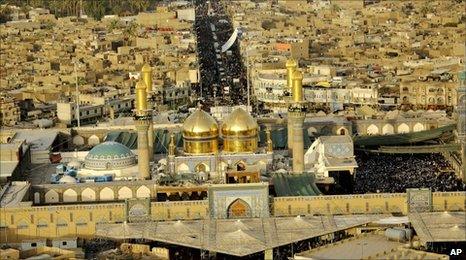Suicide bomber kills Iraqi Shia pilgrims
- Published

More than 40 people have died and some 100 have been wounded in bomb attacks on Shia pilgrims converging on a shrine in northern Baghdad, say police.
At least 30 died when a suicide bomber targeted a crowd walking through the predominantly Sunni Adhamiya district to the Imam Moussa al-Kadhim mosque.
Eleven pilgrims were killed in other bombings across the capital.
Security had been stepped up to protect the thousands of pilgrims attending a festival that culminates on Thursday.
Vehicles had been banned in the mainly Shia area of Kadhimya, where the shrine is located, and 200,000 police officers and soldiers deployed along the pilgrims' main routes.
The authorities had also imposed a city-wide ban on motorbikes, bicycles and carts to help reduce the risk of vehicle-born attacks.
"We expect the terrorist groups to launch terrorist attacks against pilgrims during the coming hours, but our contingency plans will foil their vicious acts," Maj-Gen Ahmed al-Saedi had said earlier.
The BBC's Gabriel Gatehouse in Baghdad says that while the overall level of violence is much lower than in recent years, and sectarian tensions have eased, attacks of this kind are all too frequent, particularly during high-profile religious events.
'Undeterred'
The religious festival marks the anniversary of the death in the 8th Century of Moussa al-Kadhim, the seventh of the 12 Shia imams. It was outlawed under Saddam Hussein, and has attracted large crowds since being revived.
An Adhamiya resident said he had been drinking tea and watching the pilgrims walk by when the suicide bomber struck.
"We heard a big explosion and everybody rushed to the site to see bodies and hear wounded people, screaming for help," Saif al-Azami told the Associated Press. "We helped carry the wounded to the hospital before the ambulances arrived."
Some of his Sunni friends, he said, had been serving food and water to the pilgrims and were killed or wounded in the attacks.
Despite the attacks, many pilgrims said they would not be deterred.
"Even in the time of Saddam, I came across the fields despite it being forbidden to travel to attend," Hamid Talib told AFP news agency.
"I would make the pilgrimage whatever the situation is."
Layla Abbas, 63, who was being pushed in a wheelchair by her daughter toward the shrine, told Reuters: "I'm disabled, yes, but my loyalty to Shia imams is not."
In 2005, nearly 1,000 pilgrims were killed in a stampede on the Imams Bridge, which crosses the River Tigris between Kadhimya and Adhamiya, after rumours spread that a suicide bomber was walking among them.
Last year, two female suicide bombers blew themselves near the shrine, killing 65 people, including 20 Iranian pilgrims.
Wednesday's attacks come as the US military prepares to withdraw all combat troops from Iraq by the end of August.
There are fears the long-planned move could be hindered by the failure of Iraq's major political parties to form a coalition government following March's inconclusive parliamentary election.